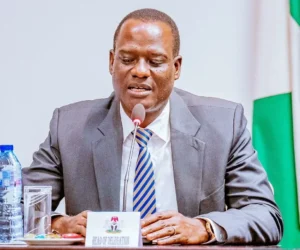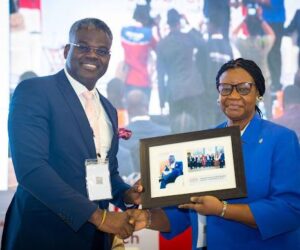In late July ever year, the rainy season peaks in North-Central, Nigeria. It is a crucial time for yam farmers in Niger State as they get busy weeding their farms to ensure a better yield. Yam seedlings, typically planted around April, will be harvested from October through the end of the year.
On a recent Wednesday morning, Weekend Trust observed Usman Saidu, a 56-year-old farmer, as he diligently removed weeds from his yam mounds in Paiko, just 23 kilometers from Minna, the Niger State capital. He has been cultivating yam for over three decades and is one of the thousands of farmers in northern Nigeria whose produce feed cities like Lagos.
Sharing his farming experiences, Saidu said, “Last year, I made 6,000 mounds of yam, and during harvest, I was able to get 2,000 very big ones and 3,000 medium sizes.
SPONSOR AD
“Keeping yam seedlings until the following year is one of the major challenges. If you are not careful they can rot before it is time to plant again.”
According to available statistics, Niger State produces over 2.3 million metric tonnes of yam annually, accounting for more than 10 per cent of Nigeria’s total yam production.
At Paiko yam market, which operates every Wednesday, farmers like Saidu sell their produce in large quantities to dealers who transport it to Lagos and other cities.
Speaking about the strong business ties between the market and Lagos, Muazu Bawa, the secretary of the Paiko Yam Dealers Association said, “The people I have in Lagos normally come here every week; some come every two weeks. Most of them buy in truckloads or half a truckload. After they transport the yams to Lagos, we give them two weeks to sell before they return for another purchase.”
To experience this journey firsthand, our team travelled from Minna to Lagos by road. We boarded a commercial Volkswagen Sharon bus at the Kpakungu, Lagos Garage. The Minna-Lagos route is active 24 hours daily for both passengers and goods. We took a break at Mokwa, where the presence of truck drivers created a lively nightlife and economic opportunities for the locals.
The 12-hour journey was a testament to the North’s role in supplying foodstuff to the South. Trucks and lorries laden with agricultural produce and cattle were a constant sight along the way. Our driver, 45-year-old Alfa Yunusa, has been plying this route for decades.
“I am Yoruba from Ilorin, Kwara State, but I see myself as a northerner. I always come to Lagos to hustle to fend for my family,” he said.
Welcome to Lagos
We arrived in Lagos and were greeted by the coastal city’s cool breeze and the energetic bustle of a new business day. Early in the morning, drivers and dealers offload produce from the North at the Ile-Epo vegetable market in Alimosho. This daily routine supplies tomatoes, bell peppers, onions and yam for the population of Lagos of over 17 million people.
Ashiru Abdulaziz, the vice chairman of the market, told Weekend Trust that they received yam from various locations, including Niger and Benue states.
He said, “We offload almost 10 truckloads of yam daily and sell them off because this business is a daily routine. However, due to inflation in the past three years, the supply has been reduced to only three or four truckloads daily.”
Weekend Trust reports that during harvest – from October to November – the market receives an even greater influx – with 20 to 30 truckloads of tomato, bell pepper and other vegetables arriving daily.
Sadiq Aliyu, a 40-year-old trader from Kano who has been at this market for 18 years also said, “I don’t have time to transport the produce myself. I have a representative who buys and supplies them to me. The supply is daily, not weekly. I sell 20 to 30 baskets of bell pepper daily; and in the ember months, I sell more than 50 bags.”
Nigeria produces approximately 3.1 million tonnes of tomato annually. However, a significant percentage is lost due to poor storage.
Highlighting key challenges to the business, Suleiman Abdullahi, a tomato supplier at the market said: “We need financial support to boost our capital. Whenever there are damages we lose a lot of money. Nobody supports us.”
He noted that the government benefitted from the revenue generated by their trucks but didn’t offer support in case of disaster.
Umar Ismail, a lorry driver also mentioned extortion as one of the challenges they face on the road, saying, “We spend a lot of money on the road while transporting the goods. Recently, I spent N67,000 settling security operatives from Benue to Lagos. In Lokoja, the Kogi State capital, a security operative asked me to park my vehicle because I refused to give him N1,000.”
But despite these challenges, the northern business community in Lagos is thriving and contributing significantly to the socioeconomic development of the state.
Ibrahim Yusuf, an official of the Hausa Traders Union at the Ile-Epo market, emphasised the importance of their trade, saying, “Vegetables are very essential goods in Lagos, but a recent youth chaos changed this record as we lost tomatoes worth more than N20 million in the violence.”
However, Kudurat Anjorin, a Yoruba trader in the market, offered a counterpoint thus: “Hausa and Yoruba are friends. We live together peacefully as one family. We are not fighting. When we need something we meet them and they give us. When we need their assistance, they assist us, so we are one.”
Gatankowa market: A symbol of northern Nigeria
A few meters away from Ile-Epo is Gatankowa market, a popular hub in the Abule Egba area of Lagos. Its Hausa name reflects the relationship between the North and South-West. Gatankowa is loosely translated to mean “blessings, favour or privilege for all,” a philosophy of life for northerners that everyone is invited to reap from God’s blessings.
The ambience in Gatankowa depicts the simple setting of northern Nigeria, where life is unhurried and food is affordable. The aroma of masa wafting through the air evokes feelings of nostalgia and longing for home. For many northerners here, Gatankowa is a home away from home.
Habiba Hassan, a 45-year-old masa trader, told our reporter that she begins her daily routine at midday, explaining, “After the call to prayer early in the morning, we pray and seek Allah’s blessings. When we resume, our leader goes to the market to buy ingredients. When she returns, we start work, wash the rice and take it for grinding. At 4pm, we start frying masa.”
She also spoke about the difference between masa made in the North and Lagos, saying, “In the core North, some use maize or sorghum, but here, we prepare it with rice and flour and mix it with yeast powder.
Habiba, who uses her income to fund her children’s education, lamented that some of her sisters resorted to street begging. She said, “Begging is bad. It is better to work and earn, no matter how little. Be content and appreciate God’s blessings.
“I thank God that my son, Ibrahim, has been here for five years. He attends both western and Islamic schools. Last Monday, they had a graduation and award ceremony and he clinched the first position in his class.”
Also sharing her experience, Maryam Gambo, who hails from Plateau State and operates a restaurant in the market said, “I have been here for the past 30 years. I came with my husband who was a driver. My brother bought a piece of land for me near a company here in Lagos and I started a restaurant there. But we were chased away from that location and our shops were demolished. Later, my brother brought me here and purchased this land for us. He even allowed others to live here free of charge.”
Agege: Centuries-old home for northerners
Located a few kilometers from the Murtala Muhammed International Airport, Agege is the largest and oldest neighborhood for thousands of northerners who have lived there since the pre-colonial era.
Tracing the history of the community, Danjuma Yakubu, a traditional titleholder of Hakimin Gabas at the palace of the Sarkin Hausawan Agege, explained that the name, Agege is a corruption of the Yoruba phrase Age-igi, which means tree-cutters. This is because Hausa people in the area were known for the lumberjack trade.
He said, “The Hausa couldn’t pronounce Age-igi due to their dialectical difference.” He also said their forefathers were prominent kola-nut merchants and their businesses contributed to the economic development of Agege and Lagos.
The Agege cattle market and abattoir in Oko-Oba is another major business hub established by northerners with the support of the Lagos State Government. It is estimated that hundreds of cattle are transported from the North to the abattoir on a daily basis.
Abubakar Tangaza, the secretary of the Lagos Cattle Dealers Association, provided key statistics thus, “We receive cattle from merchants who come from the northern part of Nigeria and neighbouring countries, such as Niger Republic, Cameroon, Chad, Ivory Coast and Mali. Every week, we offload up to 250 trucks, and each truck carries between 40 and 50 cattle.”
Weekend Trust also reports that the long existence of northerners in Lagos led to the creation of the traditional title, the Sarkin Hausawan Agege, which has been in existence since 1863.
Musa Shuaib Sarki, a prince noted, that the Hausa constabulary soldiers who were nicknamed “Glover Hausa soldiers” by the British governor in 1863 were the genesis of what we now know as both the Nigerian army and the police.
HRH Musa Muhammad Dogon Kadai, who is the incumbent Sarkin Hausawa of Agege, asked government to support the Inter-Tribal Traditional Rulers Organisation established some years ago to enable them contribute their quota towards the development of Lagos.
“We are more connected in our areas. We are the government’s eyes, ears, and legs. I want them (government) to please come in and we will help them.”
Also, one can see northerners doing menial jobs, such as cobbling, wheelbarrow pushing, scavenging, as well as those serving as local guards. This has led to the misconception that northerners are not a significant economic force in the country. As this journey shows, thousands of them transport tonnes of agricultural produce to Lagos every day. They also engage in manual labour and highest levels of business enterprise, which shows that contributions of the North to the economy of Lagos State and Nigeria in general are tangible. There is no doubt that the North is a formidable force and great pillar of Nigeria’s economic diversity.
Watch out for its documentary on Trust TV, tomorrow, Sunday, August 24th, 2025 at 7:30pm.








